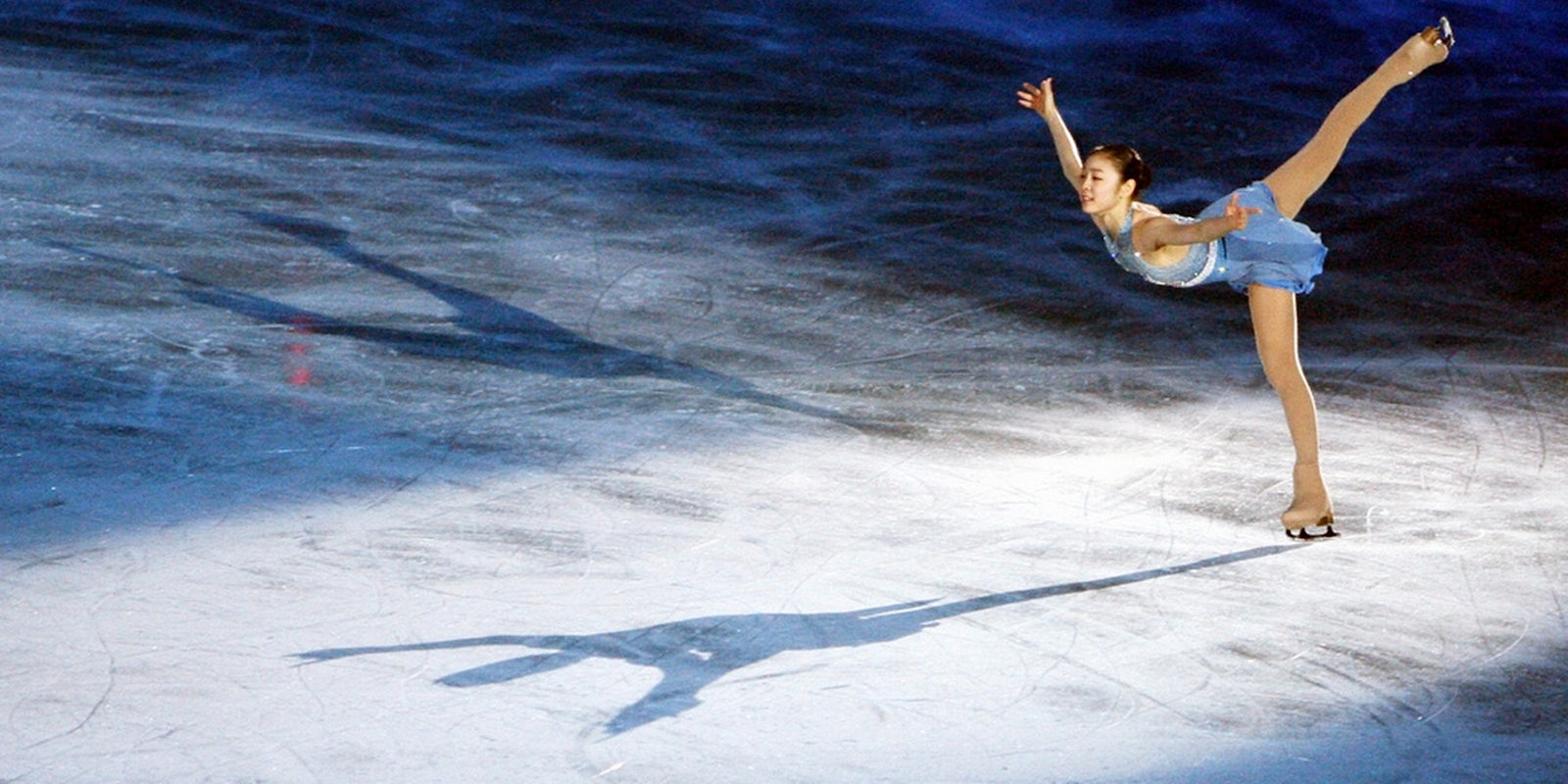When you get right down to it, sports fan culture and online fandom are pretty similar. After all, is it really any less nerdy to blog obsessively about baseball stats, as opposed to collecting comic books or cataloging all of the gay subtext in Teen Wolf?
Yet oddly enough, the two types of fandom rarely overlap. Out of the hundred million or so people who watched the Super Bowl, pretty much none of them sat down to draw some Seahawks fan art afterwards.
But figure skating is one of the very few exceptions to online fandom’s geek/jock divide. Basically, if your tastes run more to Sherlock and Supernatural than snowboarding and ski jumping, then figure skating is the one sport at the Sochi Olympics that you might actually find interesting.
A fandom can spring up around anything from Disney cartoons to coffee commercials, but most popular fandoms have a few basic traits in common: interesting characters to inspire fanfic (think One Direction or The Avengers), GIF-able footage, something cute or sexy to inspire fanart, and some kind of narrative concept to keep people interested.
Sports like football and baseball fail to fulfill most of Internet fandom’s main criteria, but figure skating? Hell yes.
It’s one of the most GIF-able sports there is, it comes with a built-in soundtrack, and its history is littered with epic rivalries, tragedy, and scandal. Plus, when it comes to shipping, well, almost every famous skater is either dating or feuding with someone else in the sport. You can’t exactly say the same thing about snowboarding, no matter how exciting it is to watch Shaun White jump over things.
Drama, drama, drama
While most sports do thrive on media narratives, from underdog comebacks to epic struggles between rival teams, figure skating is more familiar with what can only be described as “drama.”
In the ‘90s, Olympic skater Tonya Harding was embroiled in a scandal when her ex-husband hired a hitman to kneecap her competition, Nancy Kerrigan. Then in 2002, the entire judging system had to be revamped after an Olympic official was bribed to give a pair of Russian skaters the gold medal over the Canadian favorites. But it was the 2010 Olympics that turned figure skating drama into an online fanfic phenomenon, and that was mostly thanks to the rivalry between Johnny Weir and Evan Lysacek.
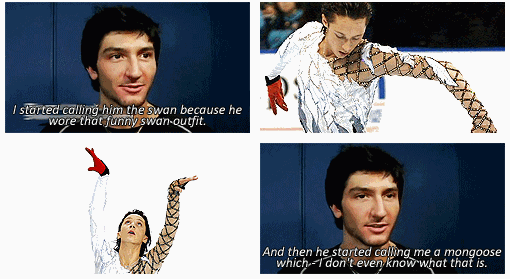
GIF via suluism.tumblr.com
Never before had two men embodied the opposing sides of men’s figure skating so well. With Lysacek and Weir both competing for Team USA and scoring at similar levels throughout their careers, it wouldn’t have been difficult for the media to manufacture a rivalry with nothing else to go on. But this wasn’t just a competition between differing athletic styles, it was a war of personalities.
Known both for his technical skill and artistic ability as a performer, Johnny Weir was always a fan favorite. But as his career wore on, he began to chafe against the strict guidelines of U.S. figure skating, particularly the pressure for male skaters to emphasise athleticism and masculinity over creative flexibility and theatricality. Despite being a three-time U.S. national champion, by 2010 he was rumored to be out of favor with judges and skating officials, who had grown tired of his reluctance to present a more masculine image as a male skater.
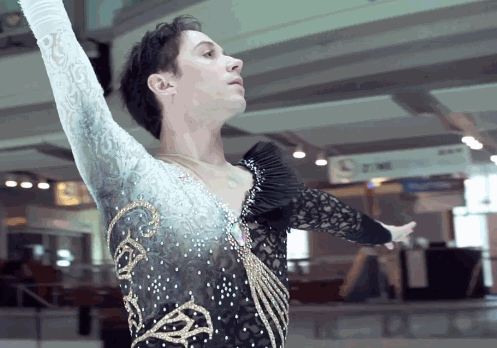
GIF via hellotailor/Tumblr
Lysacek, on the other hand, acted like a goofy dude-bro, wore subdued black costumes, and spent most of his interviews robotically repeating pre-written statements about working out and how much he loved his advertising sponsors. Then at the 2010 Olympics, Lysacek won gold while Weir ended up in sixth place—with a score that many fans thought was unfairly low, influenced by the sport’s extremely subjective judging system. (Something like this seems to happen every year, by the way, so watch out for righteously indignant skating fans at Sochi.)
Meanwhile, commentators made cracks about Weir needing a “gender test,” which Lysacek later joked about by tweeting that the “verdict was still out” on whether or not Weir was really a man.
With Lysacek’s all-black costumes and tacit adherence to the media narrative that he was the acceptably masculine face of figure skating, it was easy enough to characterize him as the villain to Weir’s artistic underdog role. It was also pretty easy for some people to imagine the pair of them having a ton of Olympic Village hate-sex, which slash fanfiction authors wrote about in droves.
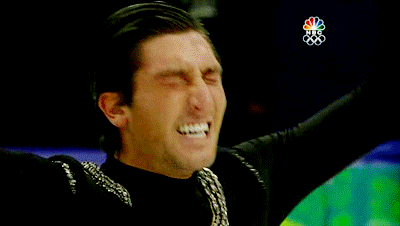
GIF via numbtongued
Four years on, Lysacek may have won the battle for Olympic gold, but Weir has won the media war. While Lysacek only seems to make public appearances to endorse products as a former Olympian, Johnny Weir went on to record a (terrible) dance-pop song, star in a reality TV show about his career, publish an autobiography, officially come out as gay, get married, and go to Sochi as one of NBC’s two Olympic skating analysts. It’s safe to say that even though his competitive career is over, he’ll still be at the center of figure skating fandom’s Olympic obsession this year.
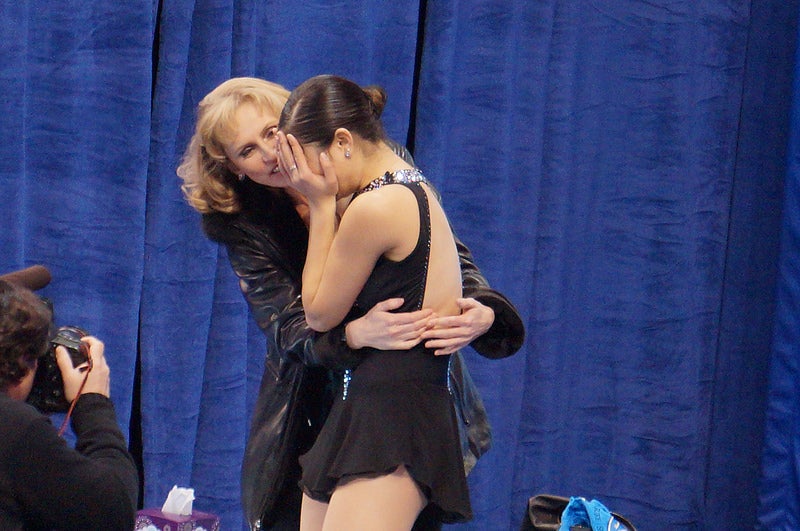
Photo via nabechiko29/Flickr
Speaking of drama, the sport has already been rocked by two controversies before the Olympics have even begun, both connected with the selection process for national teams.
In the U.S., many fans were shocked and disappointed to hear that U.S. national bronze medalist Mirai Nagasu had not been selected to compete at Sochi. Although Nagasu skated at the 2010 Olympics and came in fourth at the tender age of 16, the current women’s team consists of Gracie Gold, Polina Edmunds and Ashley Wagner, who came in first, second and fourth at this year’s U.S. Nationals. At her final appearance on the ice after the team had been selected, a tearful Nagasu was met by a standing ovation from the crowd before she even began to skate.
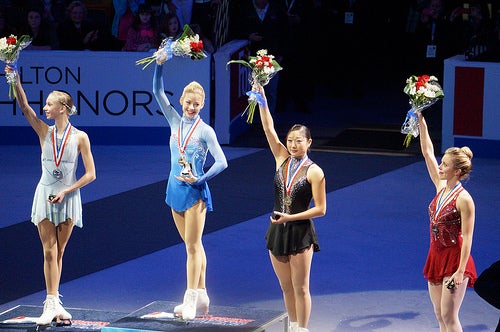
Photo via nabechiko29/Flickr
The official explanation was that Wagner had a more impressive record over the past season, but even weeks later, social media is still full of skating fans freaking out about Nagasu’s perceived Olympic snub. Wagner had already landed various lucrative advertising contracts prior to making the Olympic team, while Nagasu didn’t have a permanent coach to represent her when appealing to the selection committee. And, as some critics pointed out, Nagasu did not fulfill the white, blonde, petite ice-princess ideal represented by Wagner, Edmunds, and Gold.
“They’re sending a baby with no body of work over an Olympic veteran,” wrote Tumblr blogger axel-toe, referring to 15-year-old Polina Edmunds. “And did anyone else happen to notice how “all-American” the ladies’ delegation looks? Three young blondes…”
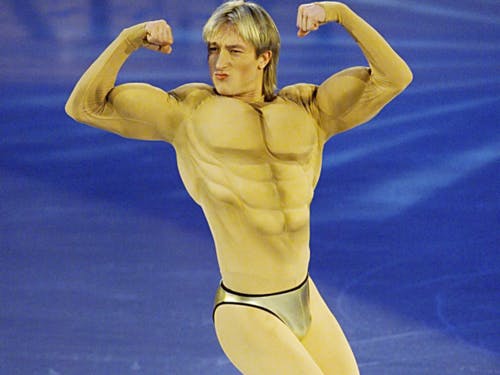
Photo via suikerpil/Tumblr
The other big pre-Olympic drama was over who would represent Russia in the men’s competition, a controversy that took the form of a baby-faced newcomer unseating the previously undisputed king of Russian skating.
After winning the Russian championship every year since 1999, 31-year-old Olympic veteran Evgeni Plushenko should’ve been a shoo-in for the Olympics. The only problem was, Russia could only send one man to Sochi, and Plushenko’s winning streak had just been broken by 18-year-old Maxim Kovtun. However, Plushenko wasn’t going to take defeat lying down. As part of a campaign to be selected over Kovtun, he asked to perform privately for a group of Russian judges and skating experts.
In the end, it felt almost inevitable that Plushenko would be chosen. Even after taking a year off from competing, he is a national hero and celebrity, having done everything from designing a fragrance to being elected to public office. He even counts Vladimir Putin among his supporters—despite Plushenko’s occasional habit of performing in drag. Then again, this sport’s attitude to gender roles has never really made much sense.
Plushenko was named as Russia’s representative just two weeks before the start of the games.
The gayest sport at the Olympics
Recently, Newsweek published an article titled “The Frozen Closet,” detailing the entrenched homophobia of competitive figure skating culture, particularly in the U.S. What with all the sequins, choreography and, admittedly, the multiple professional skaters (all male) who have come out as gay, figure skating is known publicly for being a “gay sport.” Still, the figure skating establishment has spent decades attempting to dispel this image.
In the 21st century, the problem isn’t really about whether a skater is gay, but whether he seems gay. Even though skating involves balancing on deadly metal blades and spinning around at nauseatingly high speeds, a few too many sequins could supposedly tip the balance between “masculine athlete” and “gay laughingstock.” In pairs skating, this counts even more since each pair is encouraged to look like a couple while they’re on the ice—even if they’re siblings, as parodied by Amy Poehler and Will Arnett’s incestuous double-act in Blades of Glory.
In an article asking “Why is the World’s Gayest Sport stuck in the closet?” Buzzfeed explained it simply: “There are two kinds of skaters: athletic and artistic. But these are coded butch/femme terms.”
American figure skating doesn’t want another poster boy who Instagrams himself wearing a flower crown or calls his rival a “slore” (that’s “slut/whore,” in case you were wondering), it wants someone who can look, sound and behave like Michael Phelps.
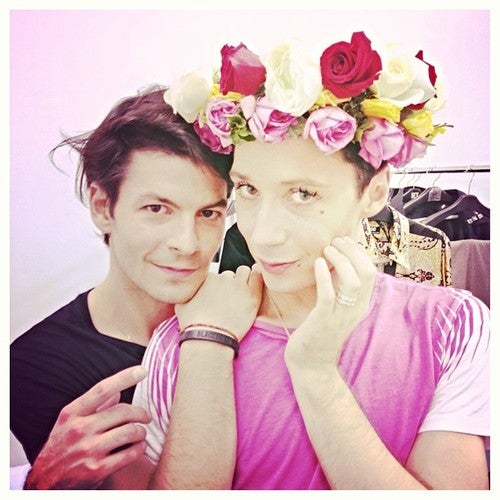
Photo via zhonnika
Two of the greatest rivalries in recent memory were dominated by this obsession with adhering to gender roles: Johnny Weir and Evan Lysacek, and Tonya Harding and Nancy Kerrigan. Lysacek’s attitude can be neatly summed up by this TMZ video where he boasts about having had 15 to 20 concussions, whereas Weir professed his love for Lady Gaga and liked to alter his choreography mid-program. As a result, Weir was the only U.S. Olympian to be excluded from the lucrative Stars On Ice performance tour, on the grounds that he wasn’t “family friendly.”
Meanwhile on the other side of the gender divide, Tonya Harding was always seen as unladylike thanks to what the media portrayed as her “white trash” upbringing, while Kerrigan was gracefully feminine and wore costumes designed by Vera Wang.
Combine all this with Russia’s recent LGBT rights record and President Putin’s comments about gay Olympians, and you have a recipe for a disastrous mix of campiness and not-so-veiled homophobia. U.S. champion Jeremy Abbott has already made headlines by saying that objecting to Russia’s homophobic laws is like visiting someone’s apartment and insulting their decor.
The situation will be made all the more surreal by the inclusion of Evgeni Plushenko. Apparently, Plushenko is such a perfect example of red-blooded Russian heterosexuality that he can get away with skating routines that rival Johnny Weir’s fishnets-and-Lady Gaga period. He’ll probably tone it down for his final Olympics, but his previous routines have included stripping down to gold underwear and comically huge prosthetic muscles, dressing up as a baby to dance to “Oops, I did it again,” by Britney Spears, and… whatever this is:
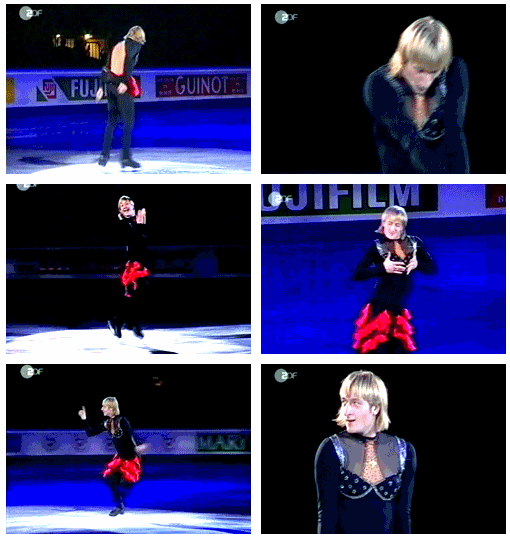
GIF via eggplantgifs/Tumblr
If anything, Plushenko’s costumes and behavior are way more out there than any of the gay (or allegedly gay) American skaters of the past few years, but as a Russian champion and a twice-married man, he can apparently do no wrong.
Shipping
Thanks to the existence of pairs competitions and ice dancing, figure skating is pretty much the only sport in the world with built-in shipping. Professional skaters don’t have much of a life outside the sport, meaning that it’s pretty normal for them to date each other. If you delve into the murky underworld of figure skating gossip forums you can probably find out which semi-closeted male skaters are currently an item, but the mainstream sports media are all too happy to provide excessive coverage of the various pairs skaters who are also real-life couples.
Jamie Salé and David Pelletier, the Canadian pair who were involved in 2002’s Olympic bribery scandal, used to be the golden couple of the skating world. They went on to get married, then divorced, and finally wound up competing separately on reality TV show Battle of the Blades, where Salé met her current husband. Sometimes, this sport can be a total soap opera.
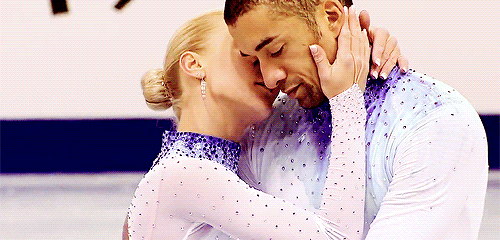
GIF via realdetective
You can be sure that once the Sochi Olympics are underway, Tumblr will be knee-deep in GIFs of pairs skaters crying and clutching on to one another. But when it comes to figure skating fanfic, male/male slash still rules the day. In the absence of an epic rivalry this season (or an adorable bromance like Johnny Weir and his former competition BFF, Swiss skater Stephane Lambiel), fandom’s one true Sochi pairing is still difficult to predict. Luckily, there’s one thing we can be sure of no matter what: Kim Yuna will be a fandom unto herself.
Kim Yuna

GIF via yunaaakim
In a sport where it’s almost impossible to say that anyone is truly the “best,” South Korean champion Kim Yuna has spent the past five years being hailed as, well, the best. Also, she’s about as close to being a Disney Princess as you’re likely to find in real life. We’d say that she sweats glitter, but Kim Yuna would never do anything so common as sweat.
The sixth highest-paid female athlete in the world, she has never finished a competition without medaling. At the age of 23, she’s also a massive celebrity in her home country, branching out into publishing, music, modeling, philanthropy, hosting a TV show, and endorsing a seemingly endless stream of products. No American or European figure skater has any hope of achieving the fever-pitch level of fannish devotion Kim inspires in Asia, and to be brutally honest, they don’t have much chance of unseating her as the reigning Olympic champion either. Her only likely rival for the gold is Japanese skater Mao Asada, who Kim historically tends to beat in competition.
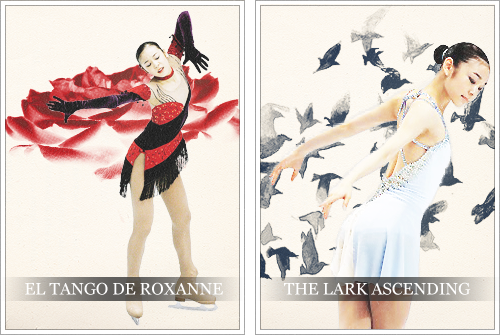
Illustration via edge-triggered/Tumblr
Things to watch out for at Sochi
- Canadian megastar Patrick Chan saying something insulting or offensive during a press conference.
- Fans accusing judges of marking Patrick Chan unfairly high thanks to “Chanflation” bias.
- Commentators mistaking one of Team USA’s blonde, sylphlike ladies for one of Team USA’s other blonde, sylphlike ladies. (The trick to remembering them is: Gracie Gold won the gold, Polina Edmund looks about ten, and Ashley Wagner is the other one.)
- Johnny Weir’s preposterously glamorous Instagram selfies.
- South Korean fangirls having meltdowns if Kim Yuna wins the gold again.
- South Korean fangirls having meltdowns if Kim Yuna doesn’t win the gold again.
- U.S. wunderkind and YouTube sensation Jason Brown coming fifteenth or twentieth in the actual competition, but winning hearts and minds with his adorably dorky smile and excitable teen Twitter antics.
- Someone coming out as gay a soon as their airplane leaves Russian soil at the end of the Games.
Until the Olympics are truly underway, it’s impossible to tell what figure skating fandom will grab onto this year. Patrick Chan and Evgeni Plushenko will probably snipe at each other through their press statements, and Johnny Weir will wear something crazy while commentating for NBC. Barring an act of God, Kim Yuna will win yet another gold medal. But in terms of shipping, rivalries and gossip, we’ll just have to wait and see.
The one thing we can be sure of is that there will be some kind of drama, and that if it takes place on the ice, it’ll be GIF-ed to death by the next morning.
Photo via queenyuna/Tumblr
